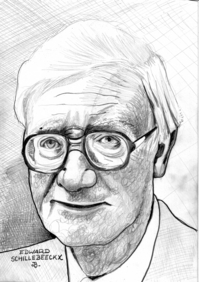
Friar Edward Schillebeeckx, OP, died on December 23, 2009. He was 96. May he rest in peace.
In my sacraments class this past semester I had to re-read Schillebeeckx's Christ, The Sacrament of the Encounter with God, which I very much enjoyed the second time. His thinking was clear and provocative and orthodox. The same level of orthodoxy can't be said of all his later work, I dare say, but it was always provocative. Apparently followers of Friar Edward's work can expect another work on sacramental theology.
And so, we pray for God's mercy, and His blessed light, happiness and peace for Friar Edward.
Here's the Wiki article on Friar Edward and the catalog of his is found here.


Actually, all of his later work is considered solidly orthodox, as any close read will indicate; indeed, he was working out of a Thomistic paradigm for his entire career. Although he was questioned 3 times by the Vatican he was never officially charged. We should strive to be careful to distinguish between something that is foreign to the way that we typically understand the Tradition and something that is unorthodox.
Dear Meg, Thanks for reading and writing. I tried to be as positive as possible, per St Ignatius of Loyola. He deserves respect in death as in life. Praying for the grace of mercy and love of God is what I advocated. All the more since I recognize his place in contemporary theology.
While it's true that Fr Edward tried work out a Thomisitc framework for understanding God and His work in our lives. However, I do think Fr Edward may have crossed limit in his Christology and sotierology. The theological investigations were regrettable.
As a Catholic theologian Schillebeeckx had the responsibility to teach the Christian Faith as it was passed down by the Church through the years and not to present his personal opinion as an acceptable alternative. As I like to recall, Catholics rely on sacred Scripture, Tradition and the Magisterium as a single deposit of the objective faith. Sadly, I am of the opinion he didn't always do his best to follow the Church in the midst of writing a new theological paradigm.
Salvo meliori judicio
Feel free to write again.
A blessed Christmastide!
I purchased his book, "Christ. The Experience of Jesus as Lord," when it was published. I had dipped into only a few passages at the time. It mostly took up space on my book shelf for 20+ years. However, upon hearing of his death, I picked it up and started reading it. In many places, I find that Schillebeeckx articulates things very well. Having discovered Giussani 5 years ago, I was pleasanty startled to re-discover that Schillebeeckx starts off by talking about experience. I realized that previously I had been confused by this talk of experience. Giussani is a great prepartion for Schillebeeckx. I am looking forward to the section,"Do we begin with the New Testament or woth present-day experience? A false alternative."
I also notice that he has some very well delineated things to say about the issue of social justice, although some of it relates to the world situation of teh time (1980) and is therefore dated.
In an attempt to put the work of Schilleebekx into context: Even with a figure as great as Augustine, not all of his thought was judged compliant with the magisterium.
Steve, Fr Schillebeeckx uses the philosophy of 'experience' and 'encounter' in Christ, "The Sacrament of the Encounter with God," a book he published in 1959 (English 1963). The footnotes are tremendous, too. Personally, I would put aside S. Christology and I would read "Christ, Sacrament" two-three times. The second time I read it things made better sense.
Not sure one can say that not all of Augustine's thought was compliant with the magisterium. That's a pretty tall assertion.
Can one think of a theologian's work as being "compliant" when it comes to matters of salvation, that is, with the objectivity of the Faith. Plus, one can't think of the development of doctrine now and apply it's principles to the 5th century.
In your study I am sure you've read the invaluable documents of Vatican II: Dei Verbum and Lumen Gentium. If you want to get deeper into a theologians ecclesial responsibilities viz. doctrine, I am sure you are familiar with Donum Veritatis (1990).